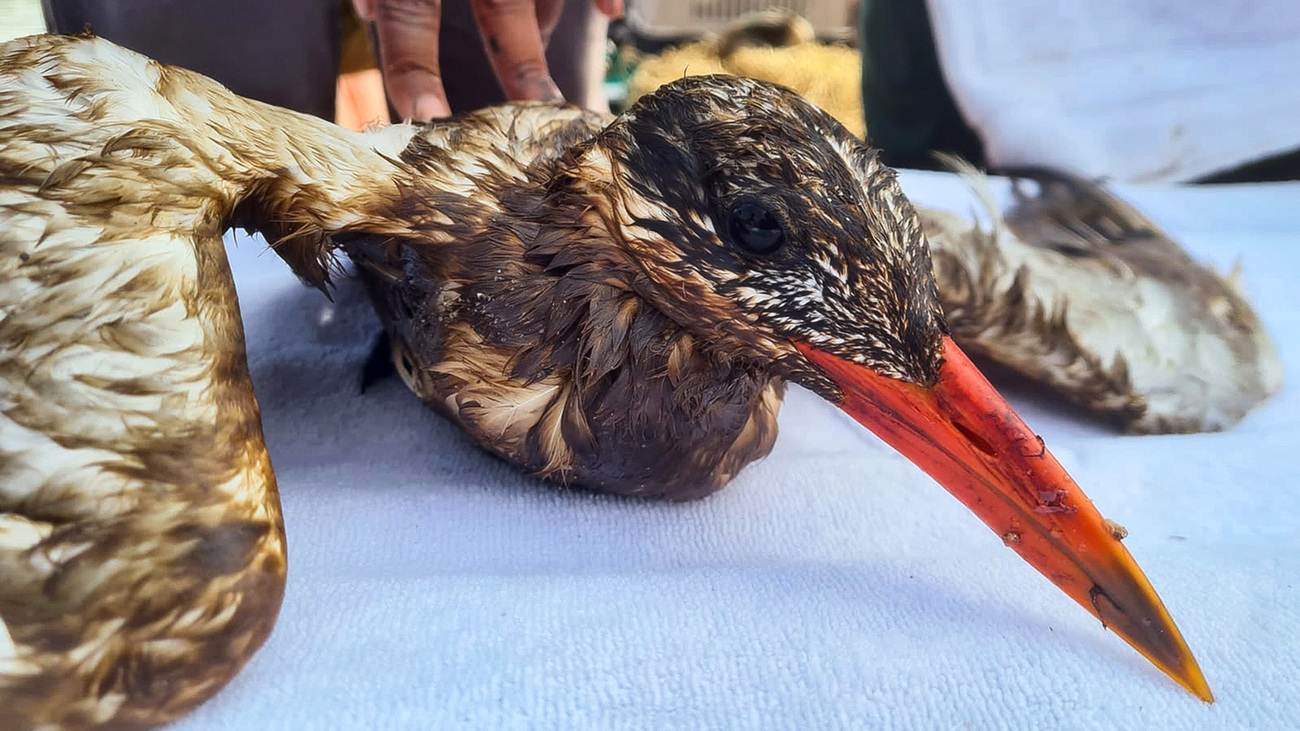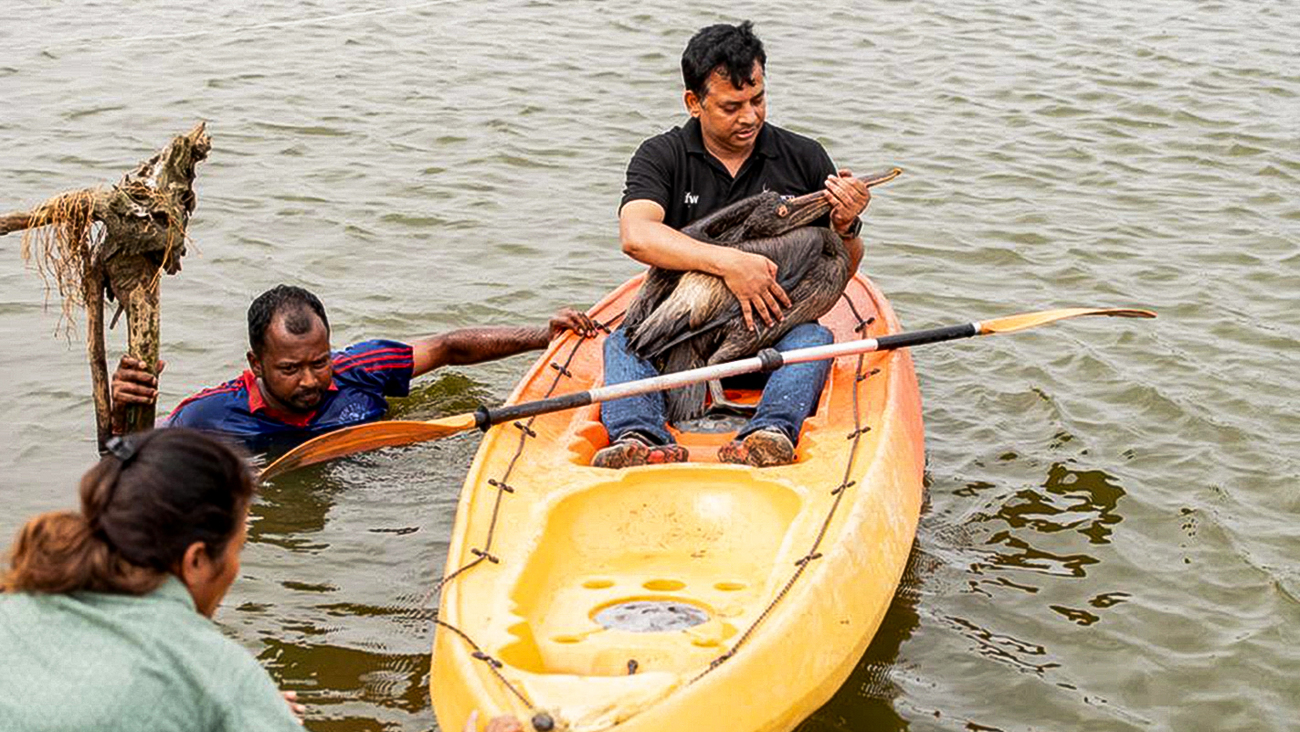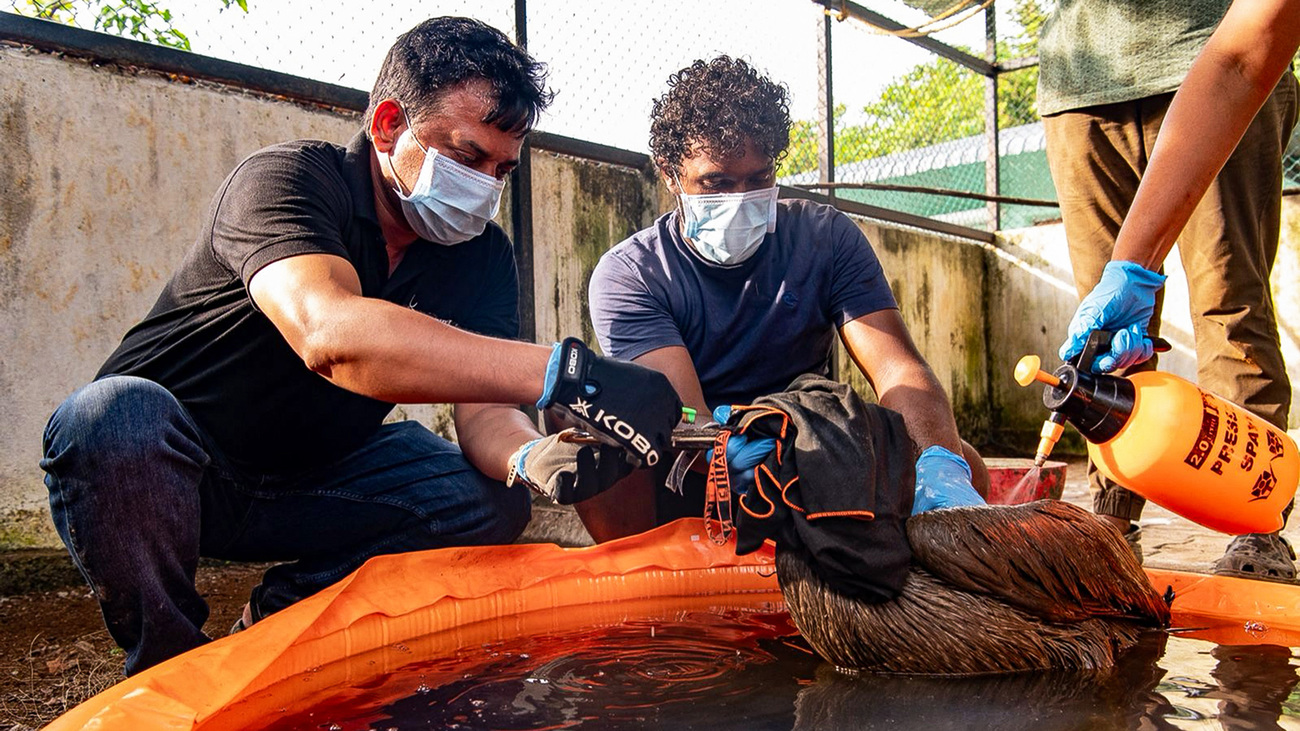Oil spill disaster impacts threatened pelicans in India
Oil spill disaster impacts threatened pelicans in India

The IFAW-Wildlife Trust of India (WTI) team was called on this January to provide technical expertise to the Tamil Nadu Forest Department and Besant Memorial Animal Dispensary (BMAD) on the rehabilitation and veterinary care of 10 spot-billed pelicans rescued from the Ennore oil leak disaster in Chennai, India.
Spot-billed pelicans are listed as ‘Near Threatened’ on the IUCN Red List. They are also the only species of pelicans known to breed in India. However, over the past month, their population along the Chennai coast has been severely affected by the recent oil spill, part of the aftermath of the cyclone Michaung.
Many species exposed to effects of oil spill
Reported first on 4 December, an oil spill from the Chennai Petroleum Corporation Limited (CPCL) spread quickly along the Kosasthalaiyar River, the Ennore Creek, and into the sea. The floods, resulting from the cyclone Michaung, aided in the quick spread, causing a serious threat to wildlife and fishermen in the backwaters.
Species inhabiting the area include large and median egrets, pond herons, cormorants, grey herons, stilts, Caspian terns, painted storks, and spot-billed pelicans. At its height, the team observed nearly 50-60 pelicans in the area in one day, and we predict there were as many as 200 pelicans affected.
‘Pelicans float [on] the surface and dive to catch fish, and this has been the reason why they have been the most affected species in this event,’ said Rudra Mahapatra, IFAW-WTI ERN responder. ‘The team also identified black-winged stilts and painted storks with oil sludge covering their legs. Other diving birds like cormorants and darters too have been affected.’
Tamil Nadu government promptly acted to contain the damage with ‘close to 900 personnel, including trained sea cleaning agencies and local fishermen, deployed to remove 105.82 kiloliters of oily water and 393.5 tonnes of oily sludge from the Enoore Creek’, as per an official statement by Supriya Sahu, Additional Chief Secretary of the Environment, Climate Change, and Forest Department.

Providing emergency relief to affected birds
The (ERN) was launched in 2004 by WTI in partnership with IFAW. ERN acts as a platform for expert and amateur rehabilitators and those working for wildlife conservation, including wildlife veterinarians, forest officials, biologists, and others, to exchange, share, and contribute their knowledge and professional skills in the care of animals in crisis and distress. ERN personnel trained in bird rescue, treatment, and rehabilitation deployed to the Ennore oil spill to join responders from BMAD in rescuing affected birds.
Sadly, the pelicans can only be captured when they become weak, a process that requires diligent monitoring day to day.
‘Once a bird is captured, it is given hydration, and the basic cleaning of orifices is done on the field,’ says Rudra Mahapatra, IFAW-WTI ERN responder. ‘On being brought to the temporary enclosure, they are thoroughly cleaned using vegetable oil and liquid detergents capable of removing oil.’
The birds are initially tube-fed with fish broth before they start feeding on their own on live and dead fishes. The team has installed inflatable water tubs on sandy flooring for the birds inside the enclosures. There are also branches provided for them to perch upon. Ultraviolet lamps and sometimes blowers are used to provide warmth to the birds when required.

More pelicans in need of rescue
Following treatment, the pelicans are promptly transferred to Guindy Children Park for care and rehabilitation. The remaining team, comprising forest department staff, rescuers from BMAD, and WTI, has been on the lookout for more affected birds across Ennore Creek.
Carcasses of cormorants and pelicans have also been recovered from the creek. There has been a high mortality of fish as well. To help large birds, the team established feeding stations by bringing in fresh fish from outside—the same species found in backwaters.
‘There are at least 20-25 more pelicans that need to be rescued and attended to,’ added Dr. NVK Ashraf, chief veterinarian with Wildlife Trust of India (WTI). ‘Once they are cleansed of oil and oil debris, they should be made fit to survive in the wild. The process is going to take some time.’
Related content
Our work can’t get done without you. Please give what you can to help animals thrive.